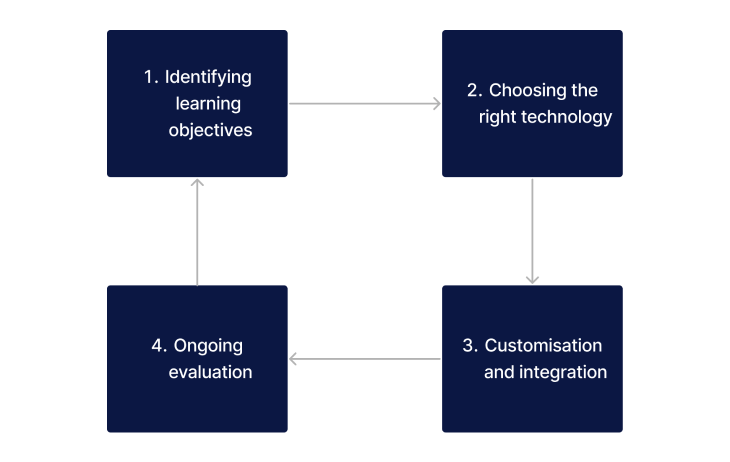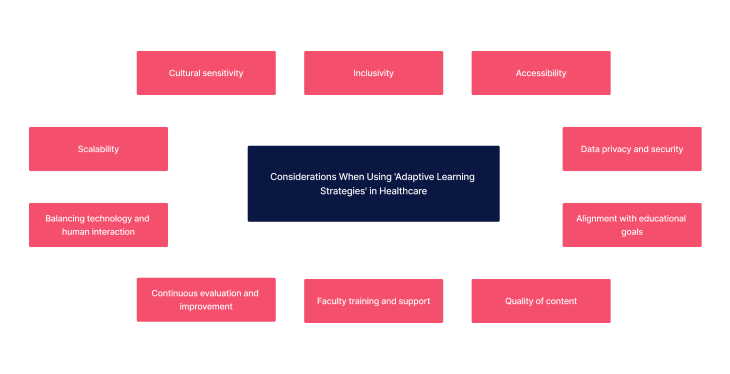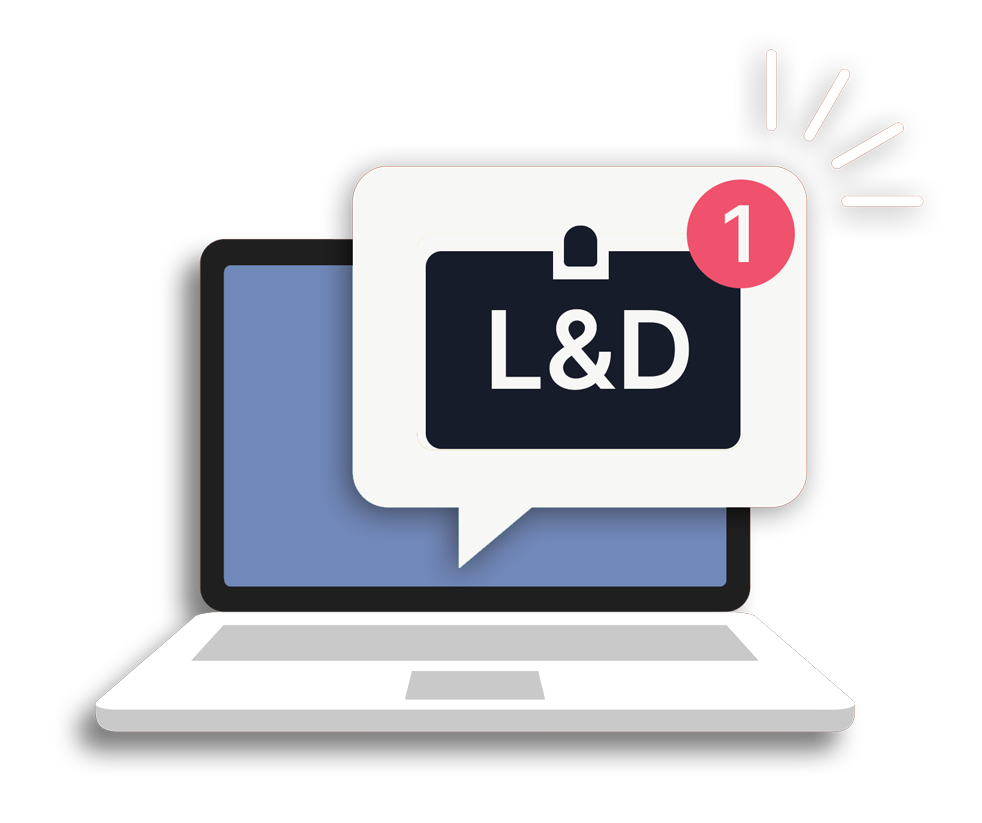Adaptive learning, a concept at the forefront of modern education, is particularly pivotal in healthcare. It revolutionises the way healthcare professionals are trained, merging the nuances of personal learning paths with the demands of the healthcare system. This article delves into the realm of adaptive learning, exploring its strategies, applications in healthcare, and providing a balanced view of its advantages and challenges.
What is Adaptive Learning?
Adaptive learning is a sophisticated educational approach that employs artificial intelligence to create personalised learning experiences. By analyzing learners' responses and behaviors, adaptive learning technology dynamically adjusts the content and pace, offering a unique learning journey for each individual. This is particularly vital in healthcare education, where the diversity of roles, from primary care to mental health, demands varied learning approaches.
What are Adaptive Learning Strategies?
Adaptive Learning Strategies refer to a set of methods and tools that support the implementation of adaptive learning. These strategies include continuous assessment, feedback mechanisms, and customised content delivery, all facilitated by advanced technologies such as machine learning and data analytics. These strategies ensure that each learner's experience is aligned with their personal learning style, pace, and educational needs.
Utilising Adaptive Learning Strategies in Healthcare
In the context of the healthcare system, Adaptive Learning Strategies can significantly enhance the training and professional development of healthcare practitioners. These strategies cater to the diverse educational needs within healthcare, from urgent care training to in-depth studies in aged care and health insurance policies.
Examples of 'Adaptive Learning Strategies'
One notable example is the Smart Sparrow platform, which offers tailored digital learning experiences for healthcare professionals. Such platforms utilise real-time data to adapt course material, ensuring that learners engage with content that is most relevant to their immediate educational needs.
How to Implement Adaptive Learning Strategies

Implementing adaptive learning strategies in healthcare requires a structured approach:
- Identifying Learning Objectives: Determine the specific educational goals for different healthcare roles, ranging from general health services to specialised areas like mental health.
- Choosing the Right Technology: Select adaptive learning platforms that are capable of supporting diverse learning needs and are compatible with existing healthcare education systems.
- Customisation and Integration: Tailor the learning content to address the unique challenges and learning objectives of healthcare professionals, ensuring it aligns with current higher education standards.
- Ongoing Evaluation: Regularly assess the effectiveness of the adaptive learning strategies and make necessary adjustments to enhance the learning experience.
Pros and Cons of 'Adaptive Learning Strategies'
The implementation of Adaptive Learning Strategies in healthcare education comes with its unique set of advantages and challenges. Understanding these can help educators and administrators make informed decisions about integrating these strategies into their teaching and learning frameworks. Here is a detailed look at the pros and cons of employing Adaptive Learning Strategies in healthcare education.
| Pros | Cons |
|---|---|
| Personalised Learning Paths: Tailors the educational content to the individual needs of each learner, making it highly relevant and effective. | High Initial Setup Cost: Significant investment required for technology infrastructure and software development. |
| Enhanced Engagement: Interactive and dynamic content keeps learners more engaged and motivated. | Reliance on Technology: High dependency on digital platforms and internet connectivity can be a limitation in resource-limited settings. |
| Immediate Feedback: Provides real-time feedback, allowing learners to understand their progress and areas for improvement promptly. | Data Privacy Concerns: Collecting and analyzing learner data raises concerns regarding privacy and data security. |
| Improved Learning Outcomes: Adapts to the learner’s pace and style, potentially leading to better retention and understanding of the material. | Technical Challenges: Potential technical issues and the need for ongoing maintenance and support. |
| Efficiency in Learning: Reduces unnecessary repetition of known material and focuses on areas needing improvement, making learning more time-efficient. | Learning Curve for Educators: Requires educators to adapt to new teaching methods and technologies. |
| Accessibility: Makes learning more accessible for a diverse range of learners, including those with special needs. | Potential for Over-reliance: Risk of over-reliance on technology, potentially neglecting the importance of human interaction in learning. |
| Data-Driven Insights: Generates valuable data on learner performance, aiding in the continuous improvement of educational content and methods. | Standardisation Issues: Difficulty in standardising educational experiences across different learning environments. |
Want a healthcare LMS that can support adaptive learning strategies?
Contact Ausmed today and see how we can support your organisation!
Considerations When Using 'Adaptive Learning Strategies' in Healthcare

While Adaptive Learning Strategies offer substantial benefits in healthcare education, their implementation requires careful consideration of several critical factors. These considerations ensure that the adoption of these strategies is effective, ethical, and enhances the overall quality of healthcare education.
- Inclusivity: Ensuring that the adaptive learning platforms are accessible to all learners, regardless of their backgrounds, learning styles, or abilities. This includes consideration for learners with disabilities and those who may not be technologically adept.
- Accessibility: The technology used should be easily accessible, taking into account factors like internet connectivity, availability of devices, and user-friendly interfaces.
- Data Privacy and Security: Implementing stringent measures to protect the privacy and security of learners' data. This involves complying with legal standards and ethical guidelines concerning data handling and confidentiality.
- Alignment with Educational Goals: The adaptive learning content must align with the broader educational goals and curriculum standards in healthcare education, ensuring it complements traditional teaching methods.
- Quality of Content: Ensuring that the content provided through adaptive learning platforms is of high quality, accurate, and up-to-date, particularly vital in the ever-evolving field of healthcare.
- Faculty Training and Support: Providing adequate training and support to educators and administrative staff in using and integrating adaptive learning technologies into their teaching practices.
- Continuous Evaluation and Improvement: Regularly assessing the effectiveness of adaptive learning strategies and making necessary improvements based on learner feedback and performance data.
- Balancing Technology and Human Interaction: While technology plays a crucial role in adaptive learning, it's important to maintain a balance with human interaction, ensuring that the human element of teaching and mentorship is not lost.
- Scalability: The ability to scale the adaptive learning solutions to accommodate a large number of learners, different learning environments, and varying healthcare specializations.
- Cultural Sensitivity: Ensuring that the learning material is culturally sensitive and appropriate, respecting the diverse backgrounds of learners in healthcare settings.
Related Resources
- LMS in Healthcare: The Roles, Benefits and Pros and Cons
- Mandatory Training: How an LMS can help you meet requirements
- Guide to Mandatory Training
- Mandatory Training in Aged Care (A Guide for Managers)
- Adapting to Regulatory Changes in Healthcare Training
- Policy Management: A Guide for Healthcare Managers
- Guide to Compliance Training (for Healthcare Managers)
- A Guide to Creating Your Own Training Modules
- A Step-by-Step Guide to Data Collection for Learning Analytics
- LMS in Healthcare: The Roles, Benefits and Pros and Cons
- A Guide to Self-Directed Learning
- How to Create a Culture of Continuous Learning
- How to Manage an Effective Staff Training Program
- Identifying Skills Gaps with Learning Analytics
- A Guide to Personalised Learning in Healthcare
Conclusion
Adaptive Learning Strategies present a transformative opportunity for healthcare education, offering tailored and efficient learning solutions. By embracing these strategies, healthcare education can better meet the needs of a diverse and evolving workforce, ultimately leading to improved healthcare delivery.
References
- Healthcare Business Today. (Year Unknown). "Revolutionizing Healthcare Education: Adaptive Learning For Better Patient Care." Retrieved from www.healthcarebusinesstoday.com.
- Wolters Kluwer. (Year Unknown). "92 Percent of Nursing Students Who Have Used Adaptive Learning Love It." Retrieved from www.wolterskluwer.com.
- American Medical Association. (2023). "Medical Education Adaptive Learning Trends & Info." Retrieved from www.ama-assn.org.



